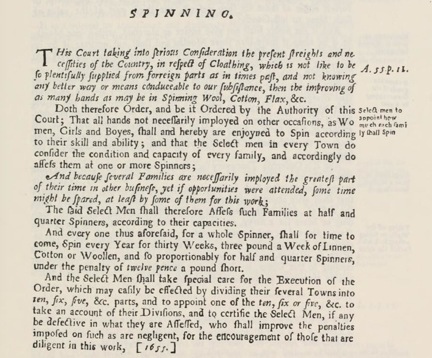Labor and Trade in Colonial America
Massachusetts Law on Spinning (1655)
Annotation
The work women did was vital to the success of the colonies. In this 1655 law, the legislature of Massachusetts sets annual targets for the amount of spinning women—aided by young girls and boys—must do. Exemptions were permitted if a family could demonstrate they could not spare the hands, but any household that simply failed to make its quota would be fined.

This Court taking into serious Consideration the present freights and necessities of the Country, in respect of Cloathing, which is not like to be so plentifully supplied from foreign parts as in times past, and now knowing any better way or means conduceable to our subsistence, then the improving of as many hands as may be in Spinning Wool, Cotton, Flax, &c.
Doth therefore Order, and be in Ordered by the Authority of this Court; That all hands not necessarily imployed on other occasions, as Women, Girls and Boyes, shall and hereby are enjoyned to Spin according to their skill and ability; and that the Select men in every Town do consider the condition and capacity of every family, and accordingly do assess them at one or more Spinners;
And because Several Families are necessarily imployed the greatest part of their time in other business, yet if opportunities were attended, some time might be spared, at least be some of them for this work;
The Said Select Men shall therefore Assess such Families at half and quarter Spinners, according to their capacities.
And every one thus aforesaid, for a whole Spinner, shall for time to come, Spin every Year for thirty Weeks, three pound a Week of Linnen, Cotton or Woollen, and so proportionably for half and quarter Spinners, under the penalty of twelve pence a pound short.
And the Select Men shall take special care for the Execution of the Order, which may easily be effected by dividing their several towns into ten, six, five, &c. parts, and to appoint one of the ten, six, five, &c. to take an account of their Divisions, and to certifie the Select Men, if any be defective in what they are Assessed, who shall improve the penalties imposed on such as are negligent, for the encouragement of those that are diligent in this work, [1655]
From The Colonial Laws of Massachusetts, Reprinted from the Edition of 1672, with the Supplements through 1686: Containing Also, a Bibliographical Preface and Introduction, Treating of All the Printed Laws from 1649 to 1686: Together with the Body of Liberties of 1641, and the Records of the Court of Assistants, 1641-1644. William H. Whitmore, ed. Littleton, CO: Rothman, 1995.
